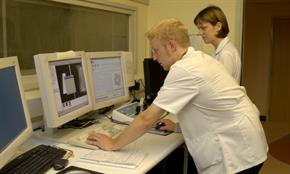
CASES

Sharing Knowledge, Enhancing Patient Care and Driving Efficiency - Collaboratively developing a new elective care model for Sheffield.
'CASES' stands for: Clinical Assessments, Services, Education and Support, and aims to provide a genuinely joined-up approach to delivering patient care.
A new model
NHS Sheffield Clinical Commissioning Group (CCG), Primary Care Sheffield (PCS) and Sheffield Teaching Hospitals (STH) are working in partnership to pilot this new elective care model for Sheffield, which will help get the best for Sheffield patients. This pilot commenced in July 2016.
The new model supports primary and secondary care to help make sure patients get the right treatment at the right time in the right place. It will initially focus on seven specialties:
- Cardiology
- Dermatology
- Ear Nose and Throat
- Gastroenterology
- Gynaecology
- Respirator
- and Urology.
Clinical Assessments
We are starting by piloting the ‘CA’ of CASES by providing a clinical assessment service to support clinicians. From this work we will quickly be able to start identifying the Services we can be developing, the Education we can provide to primary and secondary care clinicians and patients and the Support we can provide to help patients manage their own healthcare, including input the voluntary sector can provide to enhance this support.
Referrals in the above specialties will be made by the practice via Electronic Referral Service (ESR), these referrals will be peer reviewed by another GP who has received mentoring and support from individual consultants from STH.
The outcome of the referral will be communicated back to the GP within a maximum of 3 working days - if further information is required from the practice a request will be made for this and if there is an opportunity for advice and guidance this will be offered. Otherwise the CASES admin team will be advised to refer the patient onward and this response will recommend the most appropriate clinic choice to the patient.
The pilot will start initially with routine referrals but we anticipate the range or specialties and referral types will develop in year.
Please find out CASES leaflet here for more information.
What are the benefits?
- Consultants will see patients who really need secondary care expertise
- Patients will receive more treatment closer to home with minimal disruption, and fewer visits to hospital
- GPs will get direct and better feedback on referrals
Why are we doing this?
Referrals are going up year on year, and we know this is putting the whole system under pressure and resulting in longer waits. We also know from consultant feedback that many referrals are for problems that can be managed in primary care.
Watch our CASES videos, which really bring to life why CASES is needed. The videos can all be watched independently or you can watch them all. We would recommend that if you watch Sara's journey, you also watch Sara's CASES journey too for the best understanding of the changes we are proposing.


 Translate this page
Translate this page